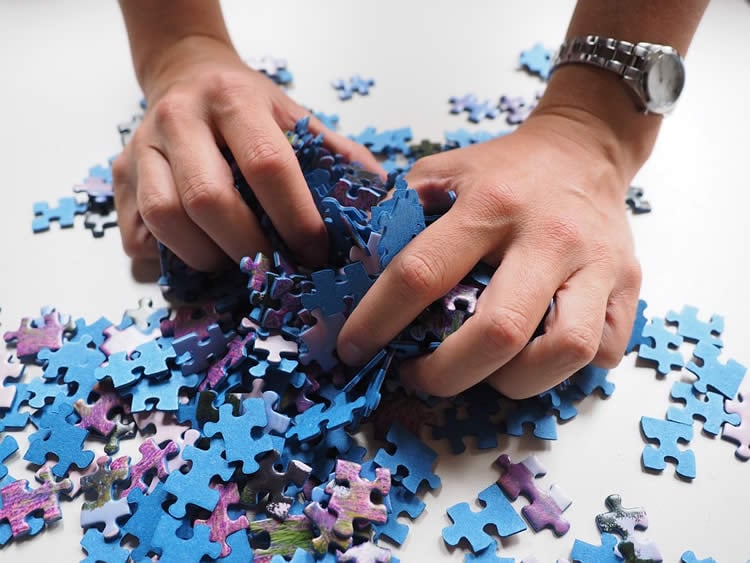Summary: Researchers report acquiring new memories can interfere with old ones, making them more likely to be forgotten.
Source: UT Dallas.
While acquiring new memories can enrich the human experience, they also can interfere with old ones and make them more likely to be forgotten — especially when a new event is highly similar to a past experience.
Postdoctoral scientist Dr. Josh Koen and Dr. Michael Rugg, director of the Center for Vital Longevity, addressed in a recent study how some memories persist in the face of strong interference. Koen and Rugg tested whether “reactivating,” or bringing to mind, old memories during the course of new learning increases or decreases the interfering effects of new learning. Their work was published in the April 13 edition of the Journal of Neuroscience.
The researchers found that reactivating generic contextual information about a previous experience, rather than details unique to a particular event, is important in resisting the interfering effects that accompany new learning.
While undergoing functional magnetic resonance imaging (fMRI), 19 study participants were shown some words twice in association with two different judgment tasks while other words were presented only once. Later memory tests required the participants to recall the distinct tasks that were associated with each of the study words, regardless of whether the words were presented once or twice.
Koen and Rugg found that older memories that were more strongly reactivated during new learning were less likely to be forgotten. In contrast to what has been previously thought, this suggests that reactivation of old memories during new learning mitigates the effects of interference and leaves those old memories intact.
One prevailing hypothesis has been that if a new experience reactivates an older memory, it returns that memory to a malleable state, which makes it susceptible to change or outright forgetting.
The researchers tested this hypothesis to see whether reactivating old memories can increase their susceptibility to interference through analyzing patterns of brain activity in the 19 adults who were scanned.

The findings that emerged shed light on how some memories are able to resist the potentially negative consequence of new learning, said Koen, first author on the paper.
“The results from our study suggest that when aspects of an older memory are reactivated during new learning, perhaps even when we are not consciously aware that the memory was reactivated, it is less likely to suffer interference and be forgotten,” he said.
Source: UT Dallas
Image Source: This NeuroscienceNews.com image is credited to Dr. Conor Liston.
Original Research: Abstract for “Memory Reactivation Predicts Resistance to Retroactive Interference: Evidence from Multivariate Classification and Pattern Similarity Analyses” by Joshua D. Koen and Michael D. Rugg in Journal of Neuroscience. Published online April 13 2016 doi:10.1523/JNEUROSCI.4099-15.2016
[cbtabs][cbtab title=”MLA”]UT Dallas. “Memories Can Resist Interference During New Learning.” NeuroscienceNews. NeuroscienceNews, 26 May 2016.
<https://neurosciencenews.com/interference-memory-learning-4311/>.[/cbtab][cbtab title=”APA”]UT Dallas. (2016, May 26). Memories Can Resist Interference During New Learning. NeuroscienceNews. Retrieved May 26, 2016 from https://neurosciencenews.com/interference-memory-learning-4311/[/cbtab][cbtab title=”Chicago”]UT Dallas. “Memories Can Resist Interference During New Learning.” https://neurosciencenews.com/interference-memory-learning-4311/ (accessed May 26, 2016).[/cbtab][/cbtabs]
Abstract
Memory Reactivation Predicts Resistance to Retroactive Interference: Evidence from Multivariate Classification and Pattern Similarity Analyses
Memory reactivation—the reinstatement of processes and representations engaged when an event is initially experienced—is believed to play an important role in strengthening and updating episodic memory. The present study examines how memory reactivation during a potentially interfering event influences memory for a previously experienced event. Participants underwent fMRI during the encoding phase of an AB/AC interference task in which some words were presented twice in association with two different encoding tasks (AB and AC trials) and other words were presented once (DE trials). The later memory test required retrieval of the encoding tasks associated with each of the study words. Retroactive interference was evident for the AB encoding task and was particularly strong when the AC encoding task was remembered rather than forgotten. We used multivariate classification and pattern similarity analysis (PSA) to measure reactivation of the AB encoding task during AC trials. The results demonstrated that reactivation of generic task information measured with multivariate classification predicted subsequent memory for the AB encoding task regardless of whether interference was strong and weak (trials for which the AC encoding task was remembered or forgotten, respectively). In contrast, reactivation of neural patterns idiosyncratic to a given AB trial measured with PSA only predicted memory when the strength of interference was low. These results suggest that reactivation of features of an initial experience shared across numerous events in the same category, but not features idiosyncratic to a particular event, are important in resisting retroactive interference caused by new learning.
SIGNIFICANCE STATEMENT Reactivating a previously encoded memory is believed to provide an opportunity to strengthen the memory, but also to return the memory to a labile state, making it susceptible to interference. However, there is debate as to how memory reactivation elicited by a potentially interfering event influences subsequent retrieval of the memory. The findings of the current study indicate that reactivating features idiosyncratic to a particular experience during interference only influences subsequent memory when interference is relatively weak. Critically, reactivation of generic contextual information predicts subsequent source memory when retroactive interference is either strong and weak. The results indicate that reactivation of generic information about a prior episode mitigates forgetting due to retroactive interference.
“Memory Reactivation Predicts Resistance to Retroactive Interference: Evidence from Multivariate Classification and Pattern Similarity Analyses” by Joshua D. Koen and Michael D. Rugg in Journal of Neuroscience. Published online April 13 2016 doi:10.1523/JNEUROSCI.4099-15.2016






